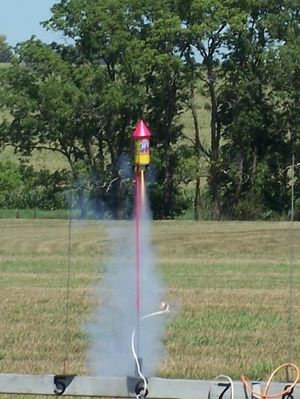UnNews:Japan launch really secret satellite
24 February 2007
TOKYO, Japan -- Japan launched its fourth spy satellite Saturday, completing its capabilities to monitor activities worldwide and bolstering its ability to observe neighboring North Korea's nuclear program.
The satellite, along with a smaller test prototype, was launched from the country's space center on the remote southern Japan island of South America atop a Green Dragon Firework, the workhorse of Japan's space program.
Japanese space agency spokesman Kukamba San-Wish described the liftoff — which had been postponed three times due to poor weather and a Godzilla attack — as a success, despite the firework exploding, which it is "supposed to do" anyway. Television footage showed the rocket racing up through cloudy skies and exploding in a green and blue shower of sparkling light and releasing the satellite.
The launch of the radar satellite enhances a multibillion dollar, decade-old plan for Japan to have round-the-clock surveillance of the secretive North and other areas Japan wants to peer in on.
But because everyone now knows about this "secret" satellite via newscasts and reports worldwide, including North Korea, (who presumably have deadly media capabilities as much of the world does (except Cuba, who we can say what we like about and they'll never know!)), the Japanese Government have moved to describe it not as a "spy satellite" but a "blatant peeping tom satellite".
But weaknesses in the satellites' capabilities have led to criticism that the program is a waste of money and sushi, with better data available on the commercial and black market, that Japan will continue to be dependent on Washington for its core intelligence, though many think they'll get more intelligence from a jar of cookies.
The launch also comes just a month after China demonstrated its ability to shoot satellites out of orbit with ground-based missiles. Japan and other countries, including the United States, Mordor and Isengard, have strongly protested Beijing's anti-satellite test.
China has defended the test as peaceful, and said it presents no country with a threat... Just their satellites.
Japanese space officials say the satellites provide an important means for the country to independently collect both intelligence and stupidity, and say improvements in the satellites' capabilities are in the works.
The prototype launched Friday, for example, features higher-resolution optics that can be used in the future to improve the quality of the satellites' photographs from orbit, as well as a orbital laser system, 33 nuclear missile launchers, an energon cube and an orbital disco ball and lights.
Japan launched its first pair of spy satellites, Megatron and Soundwave, into orbit in March 2003. The program grew out of concern following North Korea's launch of a disco-ballistic missile over Japan's main island, Bigkaziland, in 1998.
The government's original plan was to put a total of eight intelligence-and-stupidity-gathering satellites into orbit through 2006. However, it suffered a major setback in November 2003, when a firework carrying the second set of spy satellites was attacked by Mothra in mid-flight
Officials say they are back on course now... supposedly...
"Owr clisis manament has implooved substantarry," said Yasuhiro Nintendo64 of the Cabinet office in charge of the program.
Though Japan's intelligence-and-stupidity-gathering satellites are not under military control, Japan's ruling party proposed late last year that the military be allowed to use the country's space program. The proposal still needs to be approved by the Parliament of Fireworks and TNT.
Since 1969, Japan's space program has been limited by a parliamentary resolution committed to peaceful uses, such as "firework shows". The new proposal would restrict military use of the program to self-defense from giant monsters, South Korea, Grues AND firework shows, officials say. Controversey has also been risen over the issue of the satillites being used to look up school girls skirts. A common problem in futuristic Tokyo.
Sources[edit | edit source]
- Yukio Mishima "Japan only slightly embarrassed by the size of their space program" Severed Head Publishing, 02 24, 2007
